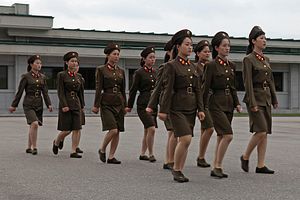This week will witness two unusual bilateral meetings. The first was held in Beijing as Japan and North Korea continue talks over the investigation of abducted Japanese citizens. The second occurs today in Seoul as Chinese President Xi Jinping makes a rare visit to South Korea before visiting North Korea. While bilateral topics will likely take center stage, issues of mutual concern between the pairs will also factor in. Japan’s new interpretation of collective self-defense will give all parties cause to take notice, while North Korea’s intransigence toward China and recent opening toward Japan is likely a factor in the order of Xi’s visits.
There has been little information as yet from the meetings in Beijing. At the opening, Japan’s head delegate Junichi Ihara said it would “be an important step in resolving the outstanding issues that lie between Japan and North Korea.” Japan brought up Pyongyang’s firing of a short-range ballistic missile this weekend, with North Korea defending itself by saying it did not agree to the U.N. Security Council’s ban on such tests, according to the Wall Street Journal. However, given the limited nature of the current negotiations, neither side has much to lose, no matter how the talks pan out. Japan’s Prime Minister Shinzo Abe would simply revert to his hardline approach to North Korea’s insincerity on the negotiations and the constant endangering of regional security through Pyongyang’s nuclear weapons and ballistic missile tests. For North Korea, falling back on its decades-long policy of denouncing Japan as an untrustworthy former colonial power usually plays well at home.
However, the potential upsides to the negotiations are significant. A satisfactory settlement for Japan of the abductees issue would be a political coup for Abe, who this week made significant headway in his attempts to normalize Japan’s military posture. North Korea reaching a settlement (albeit a minor lift in sanctions and increased aid) would be a clear indication to China that Pyongyang can create more options for itself in the region, and thus less relative dependence on Beijing.
The meeting between Xi and South Korean President Park Geun-hye will also give Japan and North Korea reason to take pause. The Chinese media has been highly critical of Japan’s move this week to change the interpretation of Article 9 of its pacifist Constitution. Both Beijing and Seoul have also expressed outrage at Japan’s recent reinvestigation into the possible South Korean influence behind the 1993 Kono statement, which apologized for Japan’s use of “comfort women” during the Second World War. As Xi signals favoritism to Seoul over Pyongyang during his visit, and the two sides resume free trade agreement talks, Xi may likely use Japan’s colonial past to further stoke anti-Tokyo sentiment, much as he tried to do in March this year when visiting Germany. Experts also expect China and South Korea to find common ground on North Korea. Shi Yinhong, an international relations professor at China’s Renmin University, expects that “During the summit talks, China is expected to guarantee that it will continue to seriously implement U.N. Security Council resolutions and maintain its stern attitude toward North Korea because North Korea sticks to nuclear weapons,” according to an interview with Yonhap News Agency.
This unusual shift by China toward the shared U.S.-South Korean-Japanese position on North Korea’s nuclear weapons, even as Japan and North Korea enter bilateral talks and Pyongyang attempts to reduce its dependence on Beijing, suggests that the regional security calculus is in flux. Granted, at this point it would not take much effort for all parties to revert to status quo ante. It is the duration and persistence of the shift, particularly with regard to Japan and North Korea that is interesting, and that change may be the catalyst for further unusual behavior from Beijing. If China perceives that its relative control over North Korean foreign policy is declining, particularly at the expense of greater Japanese influence, it may well be tempted to use its remaining influence (like Pyongyang’s dependence on Chinese energy) to pull North Korea back into line, and away from Tokyo.

































